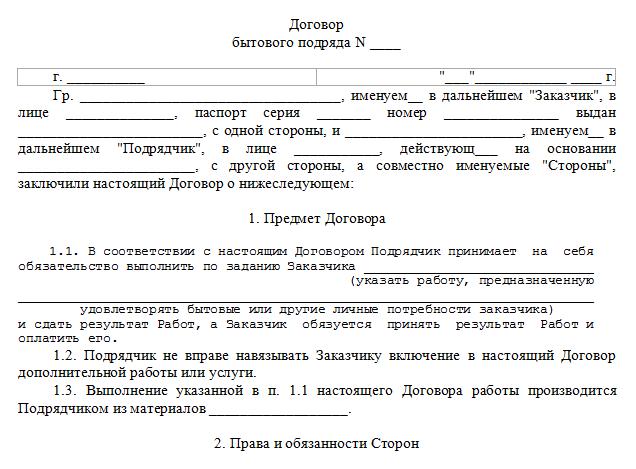A household contract is a type of contract. Its essence is in the performance of work for the personal needs of the customer. The contract has a number of features. In particular, it belongs to the category of public transactions. It is subject to additional regulation by the state.
Normative regulation
Basic or basic standards are located in the Civil Code. The second most important act is the Law on Consumer Protection.
The rules of public services for the population have also been adopted. They are dated back to 1997, but still continue to operate. It is worth noting that they cover in detail many of the emerging issues and clarify and supplement the provisions of the laws.

The rules directly affect only some types of work. The document is aimed at an indefinite number of activities.
We must not forget about the technical regulations and standards that describe the quality levels that must be achieved as a result of work.
Judicial practice plays an insignificant role due to the small number of cases in this category.
The concept of household contract
The Civil Code indicates the execution of work by order of the contractor-entrepreneur. The result relates to personal needs or domestic needs of a person. There is no talk of any use for commercial and other purposes. The usual thing is to install windows in the room where the citizen resides. If the installation is ordered by the entrepreneur for the office, then the agreement goes beyond the scope of the rules on household contracts.
Agreement form
The law requires the use of a written form (from the preparation of a full-fledged document with a detailed description of all conditions to the issuance of a receipt or check).
It doesn’t matter what method the performer resorted to, the following items must be present in the papers:
- the name and legal address of the organization; for an individual entrepreneur, an indication of F. I. O. and registration number is required;
- type of service or work and its price;
- the description and price of the materials used in the work is given;
- mark of full payment or advance payment;
- date of receipt and date of execution of the order;
- indication of warranty periods in accordance with the provisions of regulatory enactments;
- other information which, in the opinion of the parties, needs to be indicated;
- the position of the acceptor of the order and the signature of the consumer.
Features of the status of the parties
In the household contract, the contractor is either an individual entrepreneur or organizations engaged in ongoing work. Customer - an individual who has applied to meet his own needs, even if he has the status of an entrepreneur and conducts any activity.

The organization has the right to act as a customer, provided that the work is carried out in favor of third parties, for their needs and requirements. She acts as an intermediary, and her rights are not affected in any way.
Formulation Requirements
What does the assignment of household contracts to public contracts mean? The contractor is obliged to establish certain conditions for all who contact him. First of all, this concerns the terms of execution and the amount of payment. Benefits, if introduced, are also modeled on the same. Publicity obliges to accept an order from any client. The exception is the inability to fulfill the application. If there is a real opportunity to fulfill it, the refusal is considered illegal and the consumer has the right to file a claim for damages.
The texts of the contracts that are offered to citizens are posted on the websites of organizations or are offered for review when applying.
Subject of Agreement
In the contract of domestic contract for its legality and recognition as a prisoner, the following conditions are surely present: subject, terms and price.

The agreement describes the specific work and the result that the customer needs. The law prohibits the imposition of additional services or work. If they are completed or presented, the customer has the right to refuse to pay them. If the subject of the contract is described with insufficient clarity, there are grounds to consider it not concluded.
Transaction Terms
In the household contract (the sample can be seen above), it is proposed to note the start and end dates of the work. Their change is allowed with the consent of both parties, this cannot be done unilaterally.
Changes are allowed if the customer has not provided the conditions for the work or violated other conditions, which also affected the ability of the contractor to start work or to complete it on time.

Another reason is a change in circumstances that could not have been foreseen with all the prudence and good faith shown by the parties. We are talking about force majeure circumstances: popular unrest, natural disaster, mobilization of the party to the agreement in the armed forces of the country.
Some of them are listed in paragraphs describing the grounds for suspension of the limitation period.
The sample household contract gives an approximate listing of such cases. Parties are entitled to supplement or clarify them.
Price of work
Its change, as well as other conditions, is allowed with the consent of both parties. It is assumed that the contractor does not have the right to increase the amount of payment after the completion of the order in comparison with the earlier agreements. In addition, the amount of payment may be regulated by authorities. Exceeding its limit will bring the guilty person to administrative responsibility. This is one of the features of a household contract.

As a general rule, payment is made upon completion of work. If the customer agrees, the agreement provides for a different procedure (full advance payment or advance payment).
If the customer decided to withdraw from the contract, he is obliged to pay remuneration in proportion to the part of the work performed. The rule applies to those that were posted before the notice of withdrawal from the agreement.
If the contractor incurs costs associated with the execution of the contract, they are also reimbursed at the expense of the customer. For example, payment for the delivery of materials and equipment, which was not originally expected in the preparation of the estimate. This is another feature of a household contract.
Payment for materials
The law allows you to choose from whose materials to do the work. If they are provided by the contractor, payment of the cost is made in full by the customer immediately or after the completion of the order.
The amount as payment for the material can be paid by installments or using credit schemes.

The law gives freedom in determining the amount of payment for the material only until the conclusion of the contract. After its signing, a change in the price of materials on the market or for the performance of work does not give the contractor the right to increase requirements for the customer.
The legislation obliges the contractor to provide information on the certification of the material or other confirmation of the level of its quality, if this is provided for by regulatory acts.
Consumer awareness
A person engaged in household contracts is required to carry out a number of actions:
- familiarize with the rules of consumer services;
- to familiarize with the contact details of the organization or your personal, if the order is executed personally;
- provide sample contracts, models or albums with images of the results of work performed;
- provide a list of persons entitled to benefits, and a list of benefits provided.
The information should be accessible to all interested persons.Today, there is no difficulty - IPs or companies are actively using the Internet to advertise their own services and familiarize themselves with relevant information.
Before concluding the contract, the client is informed about the volume, nature of work, cost of materials and the final price of the work. If the information was not provided in full or distorted, the customer has the right to withdraw from the contract without paying part of the work performed. Reason: he counted on a different result, concluding a contract.
In addition to moral damages paid to the consumer in court, the contractor will also pay an administrative fine in favor of the state.
Upon completion of work, the contractor must explain the procedure for using the result and provide all the necessary information for safe operation. A receipt is taken to protect against claims for the future.
About rights and obligations
Parties to the household contract have a number of rights and obligations. Some of them have already been described above.
Evasion of the customer from accepting the result or his failure to appear gives the contractor the right to sell the thing, having previously informed the other party about its actions. After notification, at least 2 months should pass. The remainder of the amount after covering the debt is transferred to the second party or is deposited on a notary’s deposit.
The customer is allowed to make a choice between several options in case of deficiencies:
- Demand to eliminate deficiencies;
- demand a reduction in the price of work;
- re-do the work at the expense of the contractor;
- recover the costs of rectifying deficiencies from the contractor.
For households, the statute of limitations applies. The customer has the right to go to court within 1 year from the date of identification of the deficiencies.
If the order was accepted in stages, the deadline starts from the date of receipt of the last stage of work.

If the warranty period is established by legislative or regulatory documents, the rules are slightly different. The limitation period is calculated from the expiration of the warranty. If a statement is made during the warranty period, the statute of limitations shall be counted from the date of the statement. It is advisable for the customer to act by leaving written evidence. If the contractor refuses to accept documents, they should be sent by mail with a notification and inventory.
Document structure
The main parts:
- preamble (name of the contract, indication of the parties - F. I. O. and name of organization, place and date of conclusion);
- list of services provided, location of work;
- customer responsibilities;
- obligations of the contractor (in particular, the time during which the garbage and equipment of the contractor are removed from the place of work);
- amount of payment (indicated in numbers and words);
- start and end date of work;
- payment order;
- conditions of liability (mainly expressed in the amount paid for the delay in fulfilling obligations, for causing damage to the property of the second party);
- full details (passport data, full name of the organization, registration numbers).
The household contract is an official document, therefore, most often the contractor, even if it is an IP, is stamped. Citizens of its presence gives confidence.
